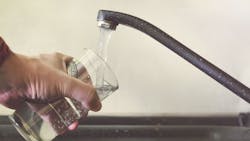The U.S. Environmental Protection Agency (EPA) announced over $30 million in grant funding under the Water Infrastructure Improvements for the Nation (WIIN) Act for six recipients to reduce lead in drinking water.
“A pillar of our work at EPA is ensuring that every person in every community has safe drinking water,” says EPA Assistant Administrator for Water Radhika Fox. “The science on lead is settled — there is no safe level of exposure. This grant funding will help reduce exposure to lead in drinking water and should be used to support underserved communities that are most at risk for exposure.”
Five of the selected projects are through two national priority areas: one to reduce lead exposure in the nation’s drinking water systems, and one to reduce children’s lead exposure through the drinking water in schools and child care facilities:
For Drinking Water Systems:
- City of Trenton, New Jersey - $5,530,000
- City of Fall River, Maine - $10,000,000
- Detroit, Michigan, Water and Sewerage Dept. - $5,000,000
For Drinking Water in Schools and Child Care Facilities:
- Hawai'i Dept. of Health - $2,000,000
- School District of Philadelphia - $4,999,658
The announced funding also includes $3.65 million to the Rural Community Assistance Partnership (RCAP), a national network of nonprofit partners and technical assistance providers.
“RCAP plays a key role in fostering the technical, managerial, and financial capacity for our nation’s small water systems,” says Olga Morales-Pate, CEO of RCAP. “We are pleased to lead and coordinate this project to help small water systems, rural schools, and child care centers overcome systemic lead-related challenges, and we thank EPA for investing in our rural infrastructure and communities.”



